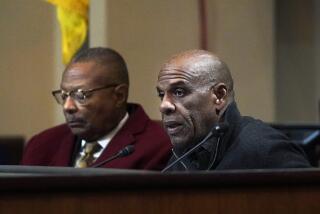Virginia faces role in slavery
- Share via
RICHMOND, VA. — The House of Delegates unanimously approved a resolution Friday expressing “profound regret” for Virginia’s role in the slave trade, a significant act of contrition by a body that used to start its day with a salute to the state’s Confederate heritage.
The resolution, one of several being considered as part of the yearlong celebration of the 400th anniversary of the founding of Jamestown, marks the furthest any state has gone in publicly offering remorse for the enslavement of millions of Africans and Caribbean Islanders during the 17th, 18th and 19th centuries.
The resolution also condemns the “egregious wrongs” that European settlers inflicted on Native Americans.
“The General Assembly hereby expresses its profound regret for the commonwealth’s role in sanctioning the immoral institution of human slavery, in the historic wrongs visited upon native peoples, and in all other forms of discrimination and injustice that have been rooted in racial and cultural bias and misunderstanding,” the resolution states.
The resolution was sponsored by Democratic Delegate A. Donald McEachin, whose great-grandfather was born a slave. Although he initially wanted an outright apology, McEachin said the final version of the House resolution “doesn’t sugarcoat the matter either.”
McEachin said it marked an important step in the state’s effort to move beyond its history of stormy race relations, which included governmentsanctioned resistance to integration during the 1950s.
“There is some pain at first, but there is a beautiful product at the end,” McEachin said of his colleagues’ decision to embrace the resolution. “Virginia had nothing to do with the end of slavery. It had everything do with the beginning of slavery.”
This year, the state and federal government will celebrate the 400th anniversary of Jamestown, where the first Europeans to arrive in America settled in 1607. In 1619, about 20 Africans arrived in Jamestown on a Dutch ship and were traded for goods, marking the start of slavery in the nation-to-be, according to National Park Service officials. Richmond became a hub for the slave trade, and the capital of the Confederacy during the Civil War.
As part of the Jamestown celebration, African American activists have launched major efforts to publicize the settlements’ role in the slave trade.
In Virginia, where the average plantation owner kept eight slaves, the slaves became the backbone of the state’s huge tobacco industry. Slavery remained a major part of the state’s culture until the end of the Civil War in 1865.
State senators are considering a competing proposal that goes further in its condemnation of slavery. Their chamber’s rules committee approved a resolution Friday that says the General Assembly “acknowledges with contrition the involuntary servitude of Africans.”
If the resolution passes the full Senate next week, as is expected, a conference committee will have to be appointed to develop compromise language.
More to Read
Get the L.A. Times Politics newsletter
Deeply reported insights into legislation, politics and policy from Sacramento, Washington and beyond. In your inbox three times per week.
You may occasionally receive promotional content from the Los Angeles Times.










